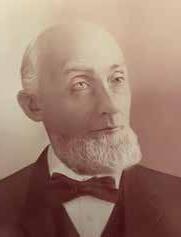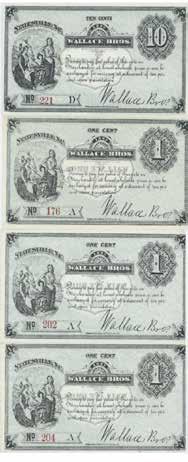
4 minute read
NC Historical Highway Marker To Be Installed in Statesville To Honor Wallace Brothers Herbarium
October 2023
By JoAnne Rosenblum
The North Carolina Department of Cultural and Natural Resources has notified JoAnne Aronson Rosenblum and Jewish Heritage North Carolina that their application for a memorial to commemorate the Wallace Brothers Herbarium has been accepted. JoAnne is the great-granddaughter of Isaac Wallace, who founded the herbarium with his brother David. Jewish Heritage NC is a non-profit dedicated to preserving and presenting the state’s Jewish legacy.
This Marker is only the seventh Historical Highway Marker honoring any Jewish person or place throughout North Carolina.
David and Isaac Wallace were antebellum Jewish immigrants from Bavaria who settled in Statesville and went on to establish the largest herbarium in the world.
Along with an enterprising spirit, the Wallaces brought their Judaism. They lived their lives by its tenets of honesty, generosity, and tikkun olam. In 1883 they started the third oldest synagogue in North Carolina, Congregation Emanuel in Statesville. They helped their entire immediate and extended family leave Germany, providing initial employment for them. They became civic and business leaders in their community, region, and state.
Initially settling in Smoaks, South Carolina in 1854, Isaac followed the railroad and opened a mercantile business in Statesville in 1859 with brothersin-law Lewis Elias and Jacob Rintels. The new “cash store” advertised “quick sales and small profits.” After the partnership ended, in 1861 David joined Isaac in the family business. In newspapers reviewed from that time, Wallace Brothers had already begun to set the commodity prices on produce and staples. While continuing in the retail business, they also sold wholesale to smaller rural stores. It is also known that they had begun a small trade in roots and herbs brought in from the surrounding hills.
During the Civil War, they continued to operate their business, but how well they managed is unknown. What is known is that it was during Passover when Union troops occupied Statesville. Mistaking their matzo for hardtack, they didn’t confiscate it!
After the War they continued what became the largest mercantile wholesale and retail establishment in the northwest part of North Carolina. Continuing to trade in roots and herbs, and “despite ridicule from those who questioned new enterprises”, in 1871 the Wallaces erected a two-story warehouse for their botanic collection. They hired a respected and accomplished botanist, Mordecai Hyams as botanical manager and the Botanic Depot became a fixture in the community. The Wallaces, with Mordecai Hyams, scoured the mountains for roots, herbs, barks, and berries that could be utilized in the pharmaceutical and liquor distilling business. In the cash-poor rural South after the Civil War, the gathering of these products provided a means for bartering to obtain goods not otherwise attainable. Wallace Brothers developed their own scrip to be used like cash in the local rural stores to which the mountain folks brought their gatherings.
The Wallaces opened offices throughout this country, Europe, and China. Ginseng was shipped by the ton to China. In 1876 tons of roots, herbs, leaves, and fruits were sent to multiple American and European cities. They also distributed to (42!) local liquor distilleries in Statesville and the surrounding area. By the late 1880’s more than 2,000 commodities were collected and processed.
Wallace Brothers Herbarium had become the largest in the world. Recognized by the state, in 1876 they represented North Carolina at the Philadelphia Centennial Exposition, winning the highest award, a gold medal, for their botanic display. Asked by the State Department to replicate the exhibit in the 1878 Paris Exposition, a gold medal was also won and another in the 1892 Chicago World’s Fair. Other collections were sent to the NY College of Pharmacy, Harvard College, the Smithsonian Institute, and the North Carolina Museum of Natural Sciences where specimens remain today.
The Wallace Brothers Herbarium continued to be recognized throughout the US, Europe, and China well into the next century. Upon the death of Sigmond Wallace in 1942, the Wallace Herbarium was finally shuttered. Their legacy is a proud gift to their family, to Statesville, the region, and the state. They would be most gratified, however, by the recognition of their Judaism in the marker that identifies them as Jewish Immigrants.
The State Historical Marker honoring the Wallace Brothers Herbarium will be unveiled on Oct. 15 in Statesville. Please contact JoAnne Rosenblum at jarose82@gmail for further information.









